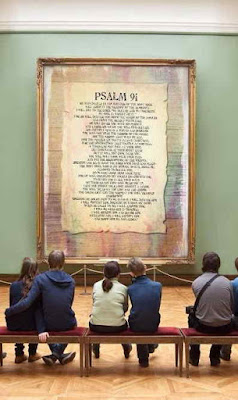In
a previous post I wrote about being prepared for some basic questions of Christians.
Now for some more 'tricky' questions.
Hasn't science disproved the Bible?
First question in response:
"What do you mean 'disproved' and 'science'? Economics is a science. How has that shown that the Bible's history of Abraham's progeny is incorrect?" That's a bit of a de-stabilising opening. But what this question usually has in mind is, the idea of evolution has trumped over the creation account in Genesis.
Firstly, nothing known to science would make anything in Genesis impossible. Ideas about evolution all depend upon life and there is nothing in science that shows us where life comes from. Science is behind the game already.
Secondly, evolution relies upon the production of determined life from randomness, entails a chemical langauge system, not a material one, being applied to molecular arrangements then it requires more time that it actually relies upon for evolution to even have a hope of producing the organisms it claims it produced.
Evolution also makes personhood something that emerges randomly from matter. The Bible tells us that matter emerges by will from personhood.
How can a God of love allow evil in the world? [He doesn’t, he fights against it! Do you?]
Most people who ask this are materialists deep down: in a material reality, there are no ‘values’ and so the concept of evil does not exist in that world. Thus, first, they must say what they mean by evil and how they can see a difference between mere inconvenience and evil, rather than seek to use a Christian concept against Christ.
Secondly, this question assumes a ‘neutral’ position of values that can be used to judge God. However, there is no such position as God is the creator and sustainer of all being, Evil is in acts that are in opposition to God. Such acts can occur as we stand in rejection of God.
He created us for fellowship, which is a personal disposition based on love given freely. If its not free, its not love. But it is free and that means we are able to turn from relationship with God. Thus people do things that are contrary to ‘God-nature’. Natural evil occurs because we have all, the custodians of the creation, rejected God and his fellowship, so, non-God-nature is in the world, meaning that our care of the world, and the world or cosmos itself is now deeply flawed; but by grace has made a way back to that in Christ – if you want to not participate in evil, turn to him.
First question in response:
"I can't understand your question until to tell me what you mean by 'God', 'love', and 'evil', or even 'world' ".
Can people be ‘saved’ through other religions? [‘Saved’ is relationship with the Creator]
Again, as above, this question presumes a ‘neutral’ world from which one can judge God. Being ‘saved’ is returning to fellowship with God, the creator and sustainer of all that is and sharing his life through the new life Christ gives us. No human invented religion can do this as they have as their object the doer (the individual human), not the giver (God).
Being ‘saved’ is not a performance category, i.e., not something we ‘earn’, but is a relationship category: being in relation with the creator, in the creator’s terms. It is the creator who founds and defines life and love in a reality that is at base personal (shown in he being God in three relating persons).
What about the people who haven’t heard about Christ? [Do they seek God or self?]
Firstly, we can rely on God’s mercy. But we also bear in mind that we all have in inner moral compass, as creatures in God’s image. Paul the apostle, and our common experience tell us that we don’t even achieve our own standards, if we are honest with ourselves. The crucial question for those who have not or could not have heard about Christ is, does one think one can rely on one’s self, or humbly admit one’s incapacity in some way?
A related issue is those who claim to be good, or ‘moral’ but do not believe in God and think this is ‘good’ or perhaps impressive to God. Firstly, is their view of themselves selective, or comprehensive? It is undoubtedly selective. We all like to remember the good bits, disregarding or supressing what does not fit our self-estimation.
Secondly, our relationship with God is one of personal commitment in love. It is not a matter of impressive ‘performance’ although we strive for ‘performance’ as a consequence of our new life
The question also relates to moral equity: those who also don’t believe in God but do ‘bad’ things, on the same life-basis as the ‘good’ atheist. Their life is in degree more rebellious to the good of others than the ‘good’ person, but not in principle. Both regard themselves as good in their own eyes.








